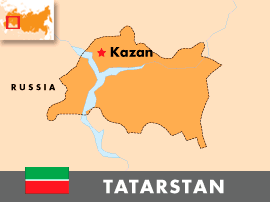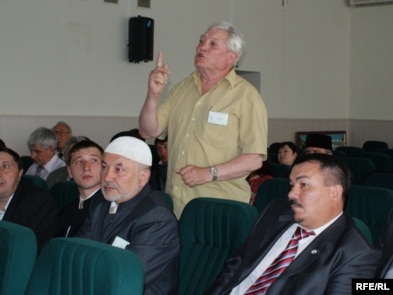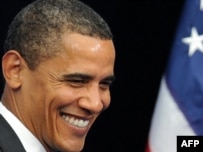06 August 2009
By Paul Goble / Special to The Moscow Times
A draft of Russia’s future nationality policy prepared by the Moscow Institute of Ethnology calls for “the systematic destruction of the federal and democratic foundations” of the Russian Federation and contains elements from Soviet practice that could lead to “the disintegration of the country,” Middle Volga activists say.
The World Kurultay of Bashkirs and the World Congress of Tatars released a joint appeal this week attacking the Moscow proposal in the name of “preserving the constitutional bases of the ethno-cultural diversity of the peoples of the Russian Federation.” Mordvin activists yesterday announced that they support the provisions of this declaration as well.
And while all three groups have been denounced as radical in the past, the decision of the Turkic Tatars and Bashkirs to issue this statement and the readiness of the Finno-Ugric Mordvins to join them suggest that the issues that the appeal raises reflect the views of many people in that region and perhaps those of others as well.
The Tatar-Bashkir declaration begins by asserting that “the situation that now exists in the country threatens the existence of the multi-national Russian Federation” because “authoritarian tendencies are increasing … and have begun to penetrate all spheres of sociopolitical and socioeconomic life.”
“Construction of the so-called ‘power vertical’ has resulted in the systematic destruction of federal and democratic foundations of the new Russian statehood that arose after the destruction of the totalitarian regime of the CPSU,” the appeal continues. The document then focuses on what its authors see as the primary threat.
“As is well-known, at one time in the USSR, the authorities persistently attempted to create ‘a single Soviet people’ without ethno-national characteristics,” they write. “[Such efforts] generated strong tension in society, especially in the sphere of inter-ethnic relations and, in the final analysis, led to the collapse of the country.”
Unfortunately, the document continues, not having learned from the past, “certain political forces of Russia today are repeating the very same mistakes by attempting to construct a so-called ‘all-civic Russian nation,’” an effort likely to entail equally “destructive” consequences for the country in the future.
The latest manifestation of such efforts, the appeal says, is the draft conception of a federal law titled “On the Foundations of Government Nationality Policy in the Russian Federation” and the explanatory supplements that were prepared by the Institute of Ethnology and that have been released with the draft concept paper.
The Tatar-Bashkir declaration with which the Mordvin group has associated itself points to five problems with the draft legislation. First, the declaration says, the concept “completely ignores the existence of national republics and their priority rights in the conduct of nationality policy in their own republics.”
As such, the Middle Volga appeal continues, the draft, in calling for “’new approaches to the development of legislation in the sphere of government nationality policy,’ is based on the leveling of all subjects of the Russian Federation, which in practice would mean the gradual liquidation of republics” within the country.
Second, the appeal notes, in the draft, “the role of the national republics in the resolution of nationality problems is subordinated to federal, regional and local national-cultural autonomies,” another violation of the historic rights of the people involved and a threat to their future existence.
Third, it continues, the draft conception ignores “the ethnic rights of the peoples of the Russian Federation” by declaring in what the Tatar and Bashkir appeal says are “abstract” and “meaningless” terms that the proposed legislation will promote “the unity of ethno-cultural and linguistic diversity.”
Fourth, the appeal says, the proposed legislation, while invoking the Declaration of the Right of Peoples to Self-Determination, in fact promotes precisely the “unification” and “centralization” of public sphere “in the sphere of nationality policy” that the Declaration is intended to counter.
And fifth, the appeal argues, the draft lays heavy stress “on the problems of national and ethnic minorities but at the same time minimizes issues concerning the ethnic development of republic-forming peoples,” yet another indication of the way in which the legislation would work to the detriment of the republics.
In its concluding section, the Tatar-Bashkir appeal says that in its current form, the draft prepared by the Moscow Institute of Ethnology and Anthropology is directed at the covert revision of the Russian Constitution, “the destruction of the language, culture and history of the indigenous peoples” of the country, and their “assimilation” into “a Russian civic nation.”
Among the comments left on the Mariuver site after it posted the Tatar-Bashkir declaration were two that are especially intriguing. According to one, the draft legislation shows that “people in the Kremlin are living absolutely in another dimension” and are trying to unite “whole peoples” with “the poor Russians whom the entire world dislikes.”
And according to the other, “the last sentence of the population of Yugoslavia showed that very people identified as Yugoslavs. After several years, out of this country arose five new states. No one in our century is running to fulfill the inventions of those in power” as the authors of the draft seem to think.
Instead, the author of the post says, “even the Roma respect their own nation and hardly are likely to identify as [non-ethnic] Russians. That is all the more the case for [ethnic] Russians and Tatars. Besides, it seems that in recent times, [Moscow] has begun to respect the Tatars and Bashkirs — apparently as a result of [their] resistance to Russification.”




 Participants at a conference of Tatar associations in Russia in July 2009.
Participants at a conference of Tatar associations in Russia in July 2009.


